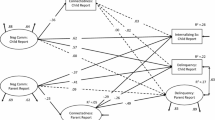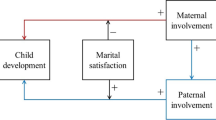Abstract
We examined how children's, parents', and observers' perceptions of the marital relationship are linked with children's adjustment. Children's perceptions of the marital relationship were assessed using a new measure, the Interparental Relationship Interview for Children (IRIC). In the first phase of the study, 63 preschoolers, 63 mothers, and 56 fathers completed questionnaires assessing the interparental relationship. Teachers assessed the children's adjustment. In the second phase, 39 of the couples enacted a typical conflictual marital interaction. Findings established the reliability and validity of the IRIC and revealed that the IRIC uniquely contributes to the prediction of children's externalizing and internalizing behavior problems. Taken together, the different perspectives of the marital relationship explained 36% of the variance in children's externalizing behavior problems. These results suggest the promise of the IRIC and demonstrate the unique contribution of the young child's perspective.
Similar content being viewed by others
References
Achenbach, T.M., & Edelbrock, C. (1983). Manual for the Child Behavior Checklist and Revised Child Behavior Profile. Burlington: University of Vermont, Department of Psychiatry.
Achenbach, T.M., & Edelbrock, C. (1986). Manual for the Teacher Report Form and the Teacher version of the Child Behavior Profile. Burlington: University of Vermont, Department of Psychiatry.
Bickham, N.L., & Fiese, B.H. (1997). Extension of the children's perception of interparental conflict scale for use with late adolescents. Journal of Family Psychology, 11, 246–250.
Bruck, M., Ceci, S.J., & Hembrooke, H. (1998). Reliability and credibility of young children's reports: From research to policy and practice. American Psychologist, 53, 136–151.
Cohen, J. (1977). Statistical power analysis for the behavioral sciences. New York: Academic Press.
Compas, B.E. (1987). Coping with stress during childhood and adolescence. Psychological Bulletin, 101, 393–403.
Cook, W.L., & Goldstein, M.L. (1993). Multiple perspectives on family relationships: A latent variables model. Child Development, 64, 1377–1388.
Crockenberg, S., & Forgays, D.K. (1996). The role of emotion in children's understanding and emotional reactions to marital conflict. Merrill-Palmer Quarterly, 42, 22–47.
Cummings, E.M., Ballard, M., El-Sheikh, M., & Lake, M. (1991). Resolution and children's responses to interadult anger. Developmental Psychology, 27, 462–470.
Cummings, E.M., Davies, P.T., & Simpson, K.S. (1994). Marital conflict, gender, and children's appraisals and coping efficacy as mediators of child adjustment. Journal of Family Psychology, 8, 121–149.
Davies, P.T., & Cummings, M.E. (1994). Marital conflict and child adjustment: An emotional security hypothesis. Psychological Bulletin, 116, 387–411.
Emery, R.E. (1982). Interparental conflict and children of discord and divorce. Psychological Bulletin, 92, 310–330.
Erel, O., & Burman, B. (1995). Interrelatedness of marital relations and parent-child relations: A meta-analytic review. Psychological Bulletin, 118, 108–132.
Feldman, S.S., Wentzel, K.R., & Gehring, T.M. (1989). A comparison of the views of mothers, fathers, and pre-adolescents about family cohesion and power. Journal of Family Psychology, 3, 39–60.
Fincham, F.D. (1994). Understanding the association between marital conflict and child adjustment: Overview. Journal of Family Psychology, 8, 123–127.
Fincham, F.D., Grych, J.H., & Osborne, L.N. (1993). Marital conflict and child adjustment: A longitudinal analysis. Paper presented at the biennial meeting of the Society for Research in Child Development, New Orleans.
Fincham, F.D., Grych, J.H., & Osborne, L.N. (1994). Does marital conflict cause child maladjustment? Directions and challenges for longitudinal research. Journal of Family Psychology, 8, 128–140.
Forehand, R., Wierson, M., McCombs, A., Brody, G., & Fauber, R. (1989). Interparental conflict and adolescent problem behavior: An examination of mechanisms. Behavioral Research Therapy, 27, 365–371.
Grych, J.H. (1998). Children's appraisals of interparental conflict: Situational and contextual influences. Journal of Family Psychology, 12, 437–453.
Grych, J. H. & Fincham, F.D. (1990). Marital conflict and children's adjustment: A cognitive-contextual framework. Psychological Bulletin, 108, 267–290.
Grych, J. H. & Fincham, F.D. (1993). Children's appraisals of marital conflict: Initial investigations of the cognitive-contextual framework. Child Development, 64, 215–230.
Grych, J. H., Seid, M., & Fincham, F.D. (1992). Assessing marital conflict from children's perspective: The children's perception of interparental conflict scale. Child Development, 63, 558–572.
Harold, G.T., Fincham, F.D., Osborne, L.N., & Conger, R.D. (1997). Mom and dad are at it again: Adolescent perceptions of marital conflict and adolescent psychological distress. Developmental Psychology, 33, 333–350.
Hetherington, E.M. (1984). Stress and coping in children and families. In A. Doyle, D. Gold, & D. Moskowitz (Eds.), Children in families under stress. San Francisco: Jossey-Bass.
Kerig, P.K. (1995). Triangles in the family circle: Effects of family structure on marriage, parenting, and child adjustment. Journal of Family Psychology, 9, 28–43.
Kerig, P.K. (1996). Assessing the links between interparental conflict and child adjustment: The conflict and problem-solving scales. Journal of Family Psychology, 10, 454–473.
Kerig, P.K., & Lindahl, K.M. (2000). Family observational coding systems: Resources for systematic research. Mahwah: Lawrence Erlbaum.
Lazarus, R.S., & Folkman, S. (1984). Stress, appraisal and coping. New York: Springer.
Margolin, G. (1981). The reciprocal relationship between marital and child problems. In J.P. Vincent (Ed.), Advances in family intervention, assessment and theory (pp. 131–182). Greenwich, CT: JAI Press.
Miller, B.C., Rollins, B.C., & Thomas, D.L. (1982). On methods of studying marriages and families. Journal of Marriage and the Family, 44, 851–873.
Noller, P., & Callan, V.J. (1988). Understanding parent-adolescent interactions: Perceptions of family members and outsiders. Developmental Psychology, 24, 707–714.
Osborne, L.N., & Fincham, F.D. (1996). Marital conflict, parent-child relationships, and child adjustment: Does gender matter? Merrill-Palmer Quarterly, 42, 48–75.
Porter, B., & O'Leary, K.D. (1980). Marital discord and child behavior problems. Journal of Abnormal Child Psychology, 8, 287–295.
Reid, W.J., & Crisafulli, A. (1990). Marital discord and child behavior problems: A meta-analysis. Journal of Abnormal Child Psychology, 6, 271–280.
Rogers, L.E., Miller, F.E., & Bavelas, J.B. (1985). Methods for analyzing marital conflict discourse: Implications of a systems approach. Family Process, 24, 175–187.
Rutter, M. (1994). Family discord and conduct disorder: Cause, consequence, or correlate? Journal of Family Psychology, 8, 170–186.
Wierson, M., Forehand, R., & McCombs, A. (1988). The relationship of early adolescent functioning to parent-reported and adolescent-perceived interparental conflict. Journal of Abnormal Child Psychology, 16, 707–719.
Author information
Authors and Affiliations
Rights and permissions
About this article
Cite this article
Erel, O., Kissil, K. The Linkage Between Multiple Perspectives of the Marital Relationship and Preschoolers' Adjustment. Journal of Child and Family Studies 12, 411–423 (2003). https://doi.org/10.1023/A:1026012023182
Issue Date:
DOI: https://doi.org/10.1023/A:1026012023182




